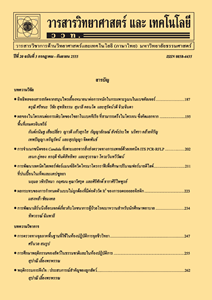ผลของโปรแกรมการฝึกไบโอฟีดแบคและเทคนิคผ่อนคลายความเครียดต่อภาวะสุขภาพและระดับความเครียดของผู้ป่วยโรคหัวใจ
Main Article Content
Abstract
บทคัดย่อ
การวิจัยนี้มีวัตถุประสงค์เพื่อศึกษาประสิทธิผลของโปรแกรมการฝึกไบโอฟีดแบคและเทคนิคผ่อนคลายความเครียดต่อภาวะสุขภาพและระดับความเครียดของผู้ป่วยโรคหัวใจ และศึกษาความพึงพอใจของผู้ป่วยต่อการเข้าร่วมโปรแกรม เป็นการวิจัยกึ่งทดลอง กลุ่มตัวอย่างเป็นผู้ป่วยโรคหัวใจที่รับการรักษาในแผนกผู้ป่วยนอก และหอผู้ป่วยอายุรกรรมของโรงพยาบาลธรรมศาสตร์เฉลิมพระเกียรติ สุ่มตัวอย่างแบบจับคู่แบ่งเป็นกลุ่มทดลองและกลุ่มควบคุม จำนวน 60 คู่ วิเคราะห์ข้อมูลเชิงปริมาณโดยสถิติ Independent t-test และโปรแกรม Excel แสดงกราฟพัฒนาการอย่างต่อเนื่องของการเปลี่ยนแปลงข้อมูลเชิงคุณภาพโดยการวิเคราะห์เนื้อหา ผลพบว่า (1) ภาวะสุขภาพและระดับความเครียดของผู้ป่วยระหว่างกลุ่มทดลองและกลุ่มควบคุม มีความแตกต่างกันอย่างมีนัยสำคัญทางสถิติที่ระดับ 0.05 (t = 2.066*; 1.993*) ภาวะสุขภาพและระดับความเครียดของผู้ป่วยระหว่างกลุ่มทดลองและกลุ่มควบคุมตามผลตรวจทางห้องปฏิบัติการ มีความแตกต่างกันอย่างมีนัยสำคัญทางสถิติที่ระดับ 0.01 และ 0.05 ตามลำดับ (t = 2.837**; 2.987**; 1.943* และ 2.339*) (2) ร้อยละ 87 ของผู้ป่วยโรคหัวใจรู้สึกพึงพอใจมากต่อโปรแกรม ร้อยละ 90 ได้รับประโยชน์ในการนำเทคนิคผ่อนคลายความเครียดไปใช้ในชีวิตประจำวัน โปรแกรมการฝึกไบโอฟีดแบคและเทคนิคผ่อนคลายความเครียดเป็นทางเลือกหนึ่งในศาสตร์แห่งการดูแลผู้ป่วยโรคหัวใจ ผลการวิจัยนี้เป็นการสร้างนวัตกรรมใหม่ และผลที่ได้สามารถเป็นแนวปฏิบัติในการดูแลผู้ป่วยกลุ่มอื่นได้เช่นเดียวกัน
คำสำคัญ : ภาวะสุขภาพ; ระดับความเครียด; โปรแกรมการฝึกไบโอฟีดแบค; เทคนิคผ่อนคลายความเครียด
Abstract
Objectives of this study were to study the effects of a biofeedback training program and relaxation techniques on the health status and stress levels of heart disease patients; and to study heart disease patients’ satisfaction regarding participating in the programs. This is a quasi-experimental research. One hundred and twenty patients from the outpatient and medical units of Thammasat University Hospital were selected by matched pairs. The effects of the program were determined via independent t-test including the excel program for demonstrating the continuous improvement of stress levels each week. Content analysis was used to analyze qualitative data. Major findings were: (1) There were statistically significant differences at the p<0.05 level between the mean scores of patients’ health status and stress levels in the experimental group and the control group (t = 2.66* and 1.993*). At the p<0.01 and 0.05 levels; there were also statistically significant differences between the mean scores in the experimental group and the control group according to a laboratory stress test (t = 2.837**; 2.987**; 1.943* and 2.339*). (2) Eighty-seven percents of the patients felt very satisfied towards the biofeedback training program and relaxation techniques. Ninety percents of patients gained benefit from applying the relaxation techniques at home. A biofeedback training program and relaxation techniques is an alternative type of care for heart disease patients. It can be said that the results of this study can help suggest innovative ways of caring; and the findings can also provide practice guidelines for caring other patient groups.
Key words: health status; levels of stress; biofeedback training program; relaxation technique


